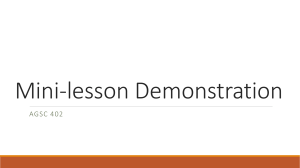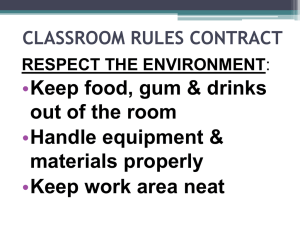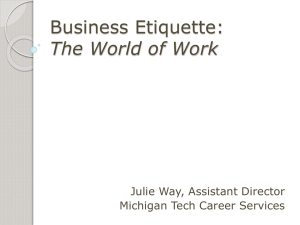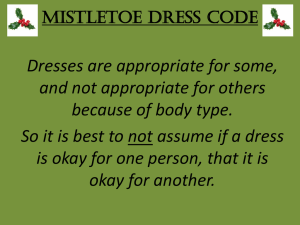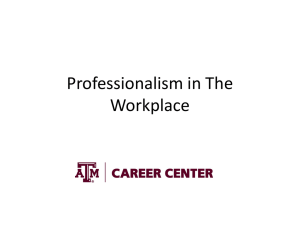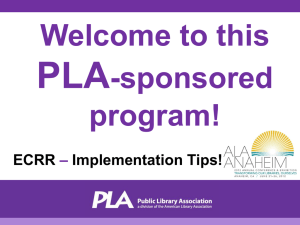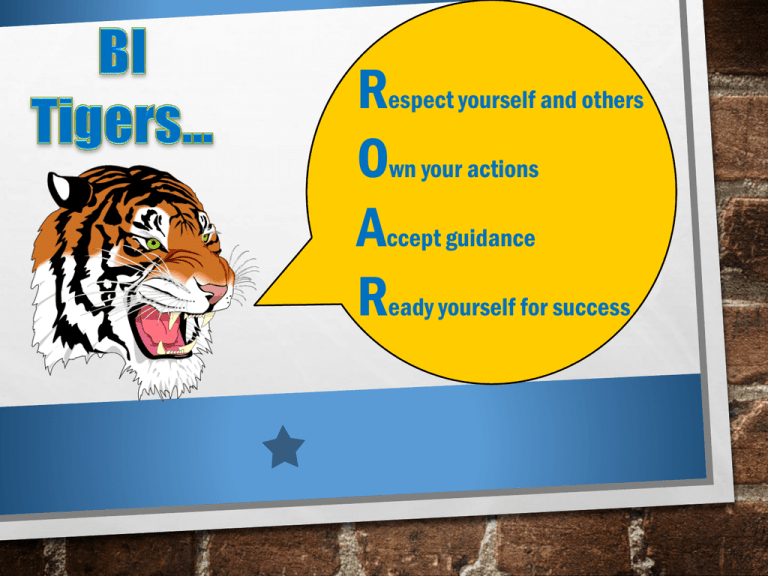
Respect yourself and others
Own your actions
Accept guidance
Ready yourself for success
Bradwell Institute Team Members:
Ms. Bailey, Ms. Bufford, Mr. Granger,
Sgt Ford, Mr. Mock, Ms. Reyna, Mr. Ryan,
Mr. Scharnagl, Ms. VanBelkum, Ms. Woodard
POSITIVE BEHAVIOR
INTERVENTION AND SUPPORTS
Rules
Discipline procedures
Rewards
Routines
School-wide Data
1. Framework for systems to identify
2.
3.
4.
5.
needs, develop strategies, and
evaluate practice towards success.
Focuses on prevention before
reaction.
Individualized.
Grounded in “teaching.”
Goal setting and monitoring.
1. Not Curriculum
2. Not about letting students “get
away” with sub-standard
behavior.
3. Not a “fix all”
4. Not all about being “positive”
and focusing on “praise”
Create Effective School-Wide Expectations that are…
1.
Stated positively
2.
Visually displayed
3.
Enforceable/able to be rewarded
4.
Smaller number (generally 3-5)
5.
Explicitly defined
Respect yourself and others
Own your actions
Accept guidance
Ready yourself for success
School-wide expectations have been defined for each location.
What does it mean to “respect yourself and others” in the
hallway? In the restroom?
Create a teaching matrix defining behavior for each part of
ROAR.
Location Hallway
Expectation
Keep all physical
contact appropriate.
Respect Yourself Use only business
language.
and Others
Own Your
Actions
Accept
Guidance
Ready Yourself
for Success
Be on time.
Be courteous.
If you make a mistake,
own it and fix it.
When an adult says
something, listen,
consider and take
appearance action.
Accept Compliments.
Follow posted signs.
Walk directly to class.
Correct dress code
issues.
Get all materials for
class at locker breaks.
Have a positive
attitude.
Read data displays.
Cafeteria
Bus Ramp
Common Areas
Rest Rooms
Keep all physical
contact
appropriate.
Use only business
language.
Don’t cut in line.
Clean up after
yourself.
Be on time.
Be courteous.
If you make a
mistake, own it and
fix it.
Correct dress code
issues.
Accept
Compliments.
Correct dress code
issues.
Follow posted
signs.
Keep all physical
contact
appropriate.
Use only business
language.
Keep all physical
contact
appropriate.
Use only business
language.
Keep all physical
contact appropriate.
Use only business
language. Wash your
hands.
Be on time.
Be courteous.
If you make a
mistake, own it
and fix it.
Be courteous.
If you make a
mistake, own it
and fix it.
Be courteous.
If you make a mistake,
own it and fix it.
Be quick, be tidy, be
gone.
Accept
Compliments
Correct dress
code issues.
Follow posted
signs.
Accept
Compliments
Correct dress
code issues.
Follow posted
signs.
Follow posted signs.
Correct dress code
issues before leaving.
Use restroom
designated by teacher.
Have a positive
attitude.
Pay on your account
at appropriate time.
Make healthy
choices at lunch.
Have a positive
attitude.
Read data
displays for bus
changes.
Have a positive
attitude.
Read data
displays.
Have a positive
attitude.
R
O
Respect Yourself Own Your Actions
and Others
Expectation
-Keep all physical
contact appropriate.
-Use only business
language.
-Be on time.
-Be courteous.
-If you make a mistake,
own it and fix it.
A
R
Accept Guidance
Ready Yourself
for Success
-When an adult says something,
listen, consider and take
-Get all materials for
appropriate action.
class at locker breaks.
-Accept Compliments.
-Have a positive
-Follow posted signs.
attitude.
-Walk directly to class.
-Read data displays.
-Correct dress code issues.
Identify
Positive
Examples
-Be inside the
classroom and seated
-A quick hug goodbye to
before the tardy bell
a friend is nice (no hips,
rings.
no lips)
-Say excuse me when
-To greet a friend, say,
you bump into someone
“Hey, how are things
-Go get your tardy,
going today?”
without arguing, when
you are tardy.
Identify
Negative
Examples
-Running through the
hall to beat the tardy
bell.
-Shoving someone out
of the way on the way to
class
-Arguing about a
corrective action such
as a dress code
infraction
-Public displays of
affection-save it for the
right place and right
time.
-Expletives—find
alternative expressions
suitable to the
environment
-Follow directives that are
given in your best interest.
-When someone tells you that
you look nice, say “thank you.”
-If the sign says , keep it in your
locker, keep it in your locker.
-Take the most direct route
between classes
-Keep your shirt tucked in and
your belt tucked up.
-Remember your
English notebook
before English class.
-Come to class ready
and willing to learn.
-Take notice of the
data displays at the
appropriate times
-Arguing about a corrective
action such as a dress code
infraction
-Giving a compliment
sarcastically
-Going in the bathroom of the
opposite sex
-Socializing in the halls instead
of taking care of business
-Tucking in shirts only after
being told to do so
-Entering the
classroom with
needed materials and
then asking to go to
the locker
-Grumbling about the
class while walking
down the hall and
entering the room.
-Using the data
display as an excuse
for being tardy
R
O
Respect Yourself Own Your Actions
and Others
Be on time.
Expectation
Keep all physical contact
appropriate.
Be courteous.
Use only business
language.
If you make a mistake,
own it and fix it.
Congregate near bus mates
with peers
Identify
Positive
Examples
Converse about school
lessons or good
experiences of the day
Horseplaying (slap boxing)
Identify
Negative
Examples
Profanity
Verbal Altercations
A
R
Accept Guidance
Ready Yourself
for Success
Accept Compliments
Correct dress code issues.
Follow posted signs.
Respond when someone speaks
Be ready to load as soon
as possible
Use manners such as, “I’m
sorry”, when necessary
Have a positive
attitude.
Be receptive to bus driver redirection with a good attitude
Notice new signage on wall,
digital displays, or
announcements
Read data displays for
bus changes.
Greet people
Use noise control
Be responsible for
finding bus changes
and spreading the
word to other bus
mates
Load sluggishly
Ignoring/avoiding people
Complain
Loiter/ block the bus door
Changing clothes before
boarding
Use high volume
Being in someone’s space
with no remorse
Ignoring bus changes
Make no effort to find
or share bus changes
R
O
A
Respect Yourself Own Your Actions
Accept Guidance
and Others
Keep all physical contact
appropriate.
Expectation
Identify
Positive
Examples
Be on time.
Use only business
language.
Be courteous.
Don’t cut in line.
If you make a mistake,
own it and fix it.
Socializing with language
appropriate for school.
Using table manners.
Pushing, shoving, or cutting
in line.
Identify
Negative
Examples
Clean up after yourself.
Throwing food.
Taking someone else’s
food.
Using profanity.
Proceeding to class when
the lunch dismissal bell
rings.
Cleaning up your trash.
Leaving trash on the table
or floor.
Loitering in cafeteria or
commons after dismissal
bell
R
Ready Yourself
for Success
Have a positive attitude.
Correct dress code issues.
Accept Compliments.
Correct dress code issues.
Follow posted signs.
Pay on your account at
appropriate time.
Make healthy choices at
lunch.
Read data displays.
Responding respectfully
(yes sir; yes ma’am) to
adults.
Remaining dress code
compliant.
Making healthy choices at
lunch.
Reading or studying.
Ignoring adult directives.
Responding disrespectfully
to adults.
Eating junk food instead of
lunch.
R
O
Respect Yourself Own Your Actions
and Others
Expectation
Identify
Positive
Examples
Keep all physical contact
appropriate.
Be courteous.
Use only business
language.
If you make a mistake,
own it and fix it.
Use good hygiene methods.
Be quick, be tidy, be gone.
Be quick and courteous in
the restroom.
Pick up after yourself,
don’t leave trash
Wash your hands.
Horse play in restrooms
Identify
Negative
Examples
Using profanity in the
restrooms.
A
R
Accept Guidance
Ready Yourself
for Success
Follow posted signs.
Use restroom designated by
teacher.
Follow all signs and directions
given by adult.
Quickly going to the
restroom and returning to
your class.
Graffiti on walls and stalls
in different types of
mediums.
Staying in the restroom
after you are finished.
Entering bathrooms when
custodians have clearly posted
signs not to enter.
Using a restroom that is not the
one designated for your use.
Have a positive
attitude.
Correct dress code
issues before leaving.
Tucking shirt in before
leaving the restroom.
Wearing non-approved
dress code items out of
the restroom.
R
O
Respect Yourself Own Your Actions
and Others
Expectation
Keep all physical contact
appropriate.
Use only business language.
Identify
Positive
Examples
Students maintain respectable
distance.
Students are ethical and use
business language.
Be courteous.
Identify
Negative
Examples
R
Accept Guidance
Ready Yourself
for Success
Accept Compliments
Have a positive attitude.
If you make a mistake, own it Correct dress code issues.
and fix it.
Follow posted signs.
Students always listen to authority.
Students caught violating
norm-accept responsibility,
fix it, & are remorseful.
Students accept compliments.
Students follow signs.
Students engage in PDA.
Students openly use profanity
with no regard for authority.
A
Students caught violating a
norm get defensive & blow
the problem way out of
proportion.
Read data displays.
Students are always in
dress code & love to
correct problems with
eagerness.
Students ignore & never listen to
authority.
Students are rude or angered when
complimented.
Students never follow posted signs.
Students are never in
dress code & refuse to
remedy the problem.
Your Classroom,
Your ROAR!
R
O
Respect Yourself Own Your Actions
and Others
Expectation
Identify
Positive
Examples
Identify
Negative
Examples
A
R
Accept Guidance
Ready Yourself
for Success
Homeroom teachers will instruct students on ROAR and the
various rules for the different common areas and the
classroom.
Try to involve the students (possibly acting out the dos and
don’ts.) If you have a group who does a good job, let us know
and we will video tape them to be used in re-teaching.
Make it interesting, but make sure the students understand that
this is serious stuff!!
Intermittent Recognition (e.g. monthly)
Description
Procedures
Inclusion Criteria
Purr-fect Students
Identify students based on
positive behavior, attendance,
and academics
Zero discipline infractions
during the month
Reward qualifiers with a dressdown day at the end of the month
Exclusionary Criteria
Students who are tardy to
school or class or accrue any
Plasco infractions are
Infractions include: not being excluded
tardy, less than certain # of
absences, no dress code
Students who receive any
infractions, etc…
discipline referrals are
excluded.
Grading Period (6 Weeks / 9 Weeks)
Description
Procedures
Inclusion Criteria
Exclusionary Criteria
Tiger Tokens
Tiger tokens are distributed daily Tokens must be earned from Students who were not
(Positive Plasco Points) to students who exhibit positive
a teacher or administrator for recognized with tiger tokens
behavior or academic successes. being exceptional.
are excluded
Student names are submitted in a
weekly and 9-week drawing for
prizes
Random
Description
Procedures
Inclusion Criteria
Exclusionary Criteria
Discipline Points
Special Events
(ie…picnics,
tournaments, debates,
sports, etc…)
Points are assigned to students
based on negative behaviors
according to the severity of the
infraction.
Points may taken away if positive
PLASCO points are earned.
The number of points
determines what each
student is eligible to attend.
Exceeding a certain number
of discipline points excludes
students from certain events.
Discipline Infraction
Level I
(Incidental/
Violations
Teacher Manages
and informally
tracks using
preferred method
Level II
Level III
(Minor Violations)
(Major Violation)
Teacher manages
and records in DRS
as an MIR
Teacher refers in
DRS and office
manages
Eating/Drinking in Class
Horseplay (No Injury)
Talking Without Permission
Public Display of Affection
Lack of Immediate
Off Task Behavior
Compliance
Chewing Gum
Not Following Classroom
ROAR
Simple Name Calling
Littering
Locker Use at Wrong Time
Verbal Warning
Gives the Student an Opportunity to Correct
No Documentation/No Report for 1st Offense
Multiple Offenses Push to Level 2 at Teacher’s Discretion
Cheating
Verbal Conflict
Disrespect
Leaving Class Without Permission
Trigger
Multiple Same Level 1 Offense
One Level 2 Offense
Procedure
Minor Offense Record (MIR) entered into DRS
Contact the Guardian or Parent
Conference with Student
Direct Refusal (“No”)
Unauthorized Sales
Cellphone\Electronic
Gambling
Devices (Student
Surrenders)
Leaving Classroom with out
Permission and does not
Return
Failure to Report to
Detention
Instigating/Interfering
Internet Misuse
Skipping
Unauthorized Items
False Report
Suspected Harassment
Unwanted Contact
Profanity (Excessive or
Directed to Staff Member)
Fighting
Drugs
Weapons
Vandalism
Written Threat
Theft/Stealing
Hitting/Kicking
Disturbance/Disrespect to
the point the class can not
continue.
Failure to Surrender Cell
Phone
Trigger
Multiple Same Level 2 Offenses
One Level 3 Offense
Procedure
If the issue prevents you from continuing to teach or requires an
immediate investigation, call for an administrator.
Enter Referral in DRS
Contact the Parent or Guardian
Incidental/Violations
(Non-referred/Non-recorded)
Teacher managed
(teacher informally tracks)
Eating/Drinking in Class
Talking Without Permission
Lack of Immediate
Compliance
Chewing Gum
Not Following Classroom
ROAR
Simple Name Calling
Horseplay (No Injury)
Public Display of Affection
Off Task Behavior
Littering
Locker Use at Wrong Time
Other:
Minor Violations
(Non-referred/Recorded)
Teacher managed
(Record in DRS as an MIR)
Teacher PROCEDURE:
Inform student of rule
violated
Implement classroom
strategy
Contact parent if necessary
(record in DRS Contact Log)
Teacher keeps an informal
record
Lying/Cheating
Indirect, inappropriate
language/gestures
Consuming food or drink in
class
Public Display of Affection
(kissing, groping)
Property destruction/misuse
(writing on desk, gum on
desk, glue on desk, etc.)
Verbal Conflict
Disrespect
Leaving Class Without
Permission
Multiple Level I Offenses
Other:
Teacher PROCEDURE:
Inform student of rule
violated
Describe expected behavior
Complete Minor Incident
Report (MIR) in DRS
Contact parent (record in DRS
Contact Log)--Required
Assign Teacher
Consequence—Ex. Detention,
written apology
Major Violations
(Referred/Recorded)
Office managed
(Refer in DRS)
Direct Refusal (“No”)
Cellphone\Electronic Devices
(Student Surrenders)
Leaving Classroom with out
Permission – Doesn’t Return
Skipping
False Report
Unauthorized Sales
Gambling
Failure to Report to Detention
Instigating/Interfering
Internet Misuse
Unauthorized Items
Suspected Harassment
Unwanted Contact
Multiple Level 2 Offenses
Other:
Major Violations
(Referred/Recorded)
Office managed
(Refer in DRS)
Profanity (Excessive or
Directed to Staff Member)
Fighting
Drugs
Weapons
Vandalism
Written Threat
Theft/Stealing
Hitting/Kicking
Disturbance/Disrespect to the
point the class can not
continue.
Failure to surrender cell
phone.
Other:
Teacher PROCEDURE:
Teacher PROCEDURE:
Inform student of rule
Buzz the Office
violated
Use the term “immediately”
Complete an Office Referral in
to communicate an
DRS
emergency. (Office Staff will
Contact parent
call a Code 2)
Complete an Office Referral in
DRS
Contact parent, unless told by
an administrator to not do so.
CONTACT LOG – DRS
MINOR INCIDENT REPORT – DRS
REFERRAL – DRS
INFORMATION IS POWER!



